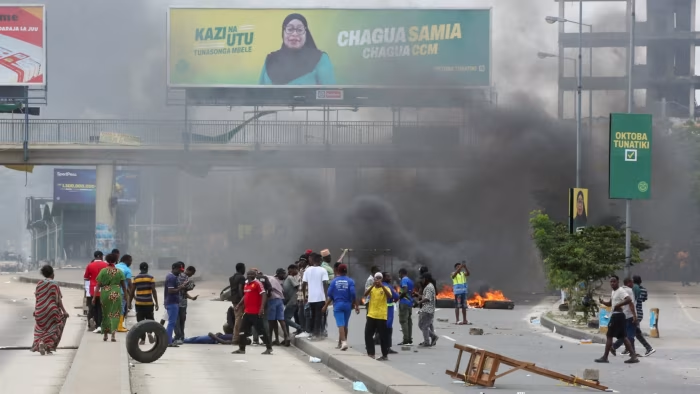It is the third day of protests in Tanzania, as citizens blocked roads to oppose the presidential election held on October 29, 2025, refusing to comply with requests from the Tanzanian military to halt the demonstrations.
The protesters, mostly youth, claim the elections were not transparent, noting that many opposition politicians were either imprisoned or removed from the candidate lists.
Tanzania’s military commander, Gen. Jacob John Mkunda, told the national television that security forces are working to restore order and urged protesters to stop their actions.
He said, “Some individuals who blocked roads on October 29 are committing criminal acts. These are criminals, and the unlawful activities must stop.”
The protests intensified when the Electoral Commission announced that Samia Suluhu Hassan received 95% of the votes in the Mbeya region.
Despite military warnings, protesters continued demonstrations in several cities across the country.
Currently, the internet has been shut down in Tanzania, and many media outlets are offline, making it difficult to access information from within the country. For example, The Citizen newspaper’s latest report is from October 29, 2025, when the elections began.
Seif Magango, spokesperson for the UN Human Rights Office, called on Tanzanian security forces to refrain from using excessive force.
The government has advised both public and private sector employees to work from home due to the protests.
It is expected that President Samia Suluhu Hassan will win the election. In Zanzibar, CCM party candidate Hussein Mwinyi reportedly won with 80% of the votes.
Opposition groups have criticized the election results, claiming irregularities occurred.
Protesters have gone as far as burning posters of Samia Suluhu Hassan.
Regional Stability at Stake
Unrest in Tanzania doesn’t just stay inside its borders; it puts the whole East African Community on edge. The EAC has spent years trying to pull its members together, hoping for more trade, stronger economies, and some real stability. But when violence drags on in one country, all that hard work can start to unravel. Investors notice. They get nervous. And that hits everyone.
Right now, people all over East Africa are glued to what’s happening in Tanzania. Everyone’s hoping things settle down and common sense wins out. Regional leaders will probably push for talks soon, trying to keep things peaceful and make sure the region doesn’t lose the economic progress it’s worked so hard for.
The question remains, if Tanzania’s situation continues to deteriorate, how far will its impact reach Rwanda and the rest of East Africa?





